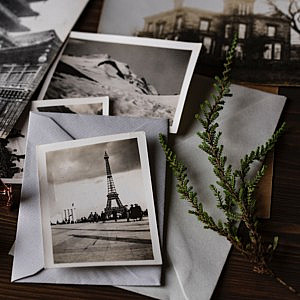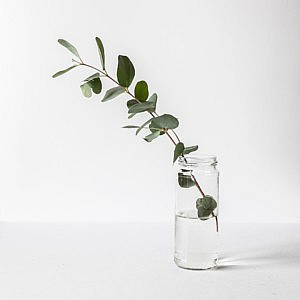Decluttering when someone has died
Sentimental items are without a doubt the most difficult things to deal with when decluttering. Emotions around objects can be incredibly strong, as we link feelings and memories to physical objects and this is especially true when someone has passed away. In this post, Zoe Berry of Life/Edit gives her advice on decluttering a lifetime of possessions after someone dies.

Decluttering when someone has died: How to deal with a lifetime of possessions
Recently I have worked with two clients for whom this is a huge issue: they are responsible for decluttering after someone has died, and they find themselves hanging on to far too much stuff because of an almost paralysing inability to make decisions on what to do with it all. There are varied reasons for this: in these particular cases, the sheer volume of it all was overwhelming. Where do you start with a whole house or the contents of someone’s entire life that’s ended up in boxes in your loft? But perhaps greater than this is the associated guilt. When someone has died it can be so hard to part with their belongings: knowing how hard the person worked for them, knowing what the items meant to the person, worrying that you are being disloyal or disrespectful by simply ‘getting rid’ of them, or not knowing who to give them to or where they should go if you do want to part with them. This post explores how you can respectfully and thoughtfully keep someone’s memory alive without having to be the keeper of all of their belongings.
First: ask for help
This is going to be hard. You probably can’t do it on your own, so allow the people who are offering help to work through it with you. Or if this isn’t an option, look up a professional declutterer here: https://www.apdo.co.uk/find-an-organiser/. We are trained to help you, and can help to guide you through the process.Start with the ‘least difficult’
In the case of post-bereavement decluttering, there probably isn’t an ‘easy’ place to start, but whatever you do, don’t start with the most emotional things. You’ll know what these are. For some people it’s about their mum’s clothes, for some it’s their husband’s precious collection of books which were his pride and joy. For some people it’s about something that may seem entirely random but you will know what is going to be the most difficult for you. Leave that until the end.
Do I really want to keep this?
Look at the item and ask yourself: what precisely am I sentimental about? Chances are, it’s not the object itself but its association with a person, place, or time. You will retain that memory without a physical object to remind you. However if you look at the item and love it, then it’s not clutter.

Let go of guilt
Often people keep items not out of love or nostalgia, but guilt. It could be because it feels ‘bad’ to get rid of something, or it could be because you had a difficult relationship with the person who has died and you’re subconsciously trying to make it better. Allow yourself to realise that your complex relationship with your aunty will not be fixed if you keep hold of her hideous set of figurines now that she has passed away.
Take a photograph
If you have your grandparents’ table and chairs and you know you can’t keep them and won’t use them, take a photo of them as part of the process of letting them go. Use the same logic as you do with other parts of your decluttering life (you wouldn’t keep all your kids’ toys for example) and apply it to the post-bereavement decluttering.
Pass it on
Do some quality research before passing your items to charity. Some charities only take specific things (for example, no electrical goods) and you don’t want to be turned away after the difficult and emotional process of sorting through, loading your car and driving to the charity shop. Recently I donated a whole lifetime’s worth of clothes which had belonged to a client’s mum. Going through these clothes was so difficult for my client, she spent hours in tears remembering the stories that went with them: where her mum wore them and how they summed her up. I made sure these clothes went to a charity shop local to me which specialises in vintage clothing. For this client, the idea that the next generation of vintage-loving young women would be soon wearing them filled her with joy and pride.

Family
You may not want something or have room for it, but you can always offer it to others in the family. Remember to check with them first before packing an object off to somewhere outside the family.
Upcycle
To hold onto your connection with something, create something new that retains its sentimental value. An example of this recently was an antique chair belonging to a client’s beloved great aunty. I encouraged her to upcycle it so it fitted more in to her house décor and she covered it with some beautiful fabric bringing it right up to date whilst still retaining the nod to her family member.
Dealing with collections
It’s very difficult when dealing with the possessions of an avid collector. Your dad may have loved his thousands of model cars, your brother loved his rooms full of books, but it doesn’t mean you have to absorb them into your home. Choosing one or two keepsake items to represent a collection, person or era can allow you to let the rest go.
Memory Box
Just as you’d keep a memory box for your children with their precious school drawings, first shoes and other sentimental items, you can also do this for someone who has died. It doesn’t matter how off-the-wall these things are – if an empty margarine tub makes you chuckle thinking about your gran, then pop it in the box. This is a good way to preserve memories without taking up too much space. It also keeps the items all together, so you can choose when you want to look at them, particularly if grief is still very raw.
Most of all be kind to yourself. Take time, acknowledge that this is one of the hardest things to do, accept help and reward yourself when you make progress.
